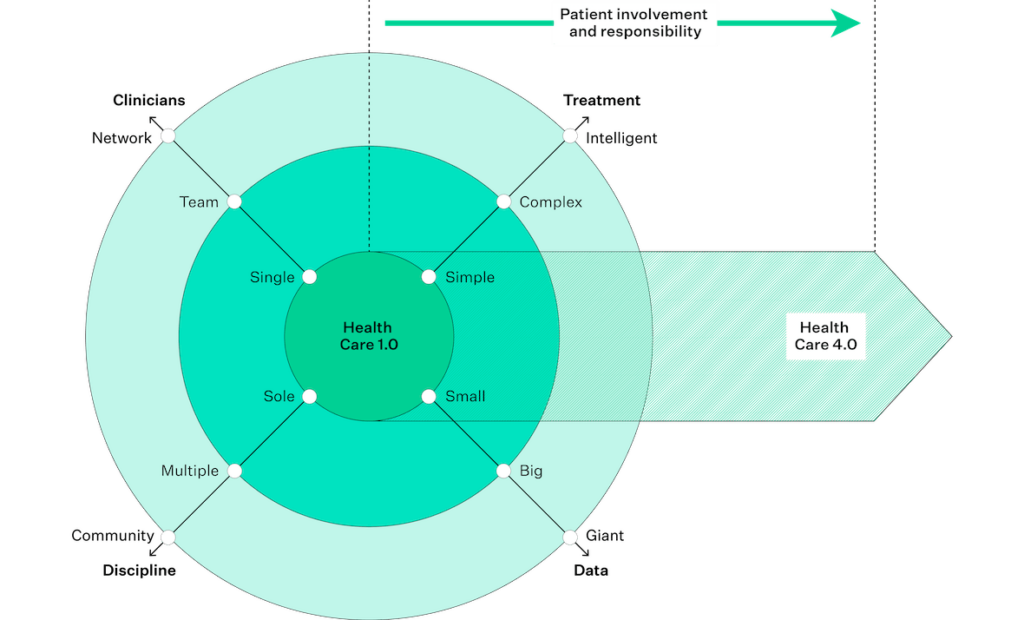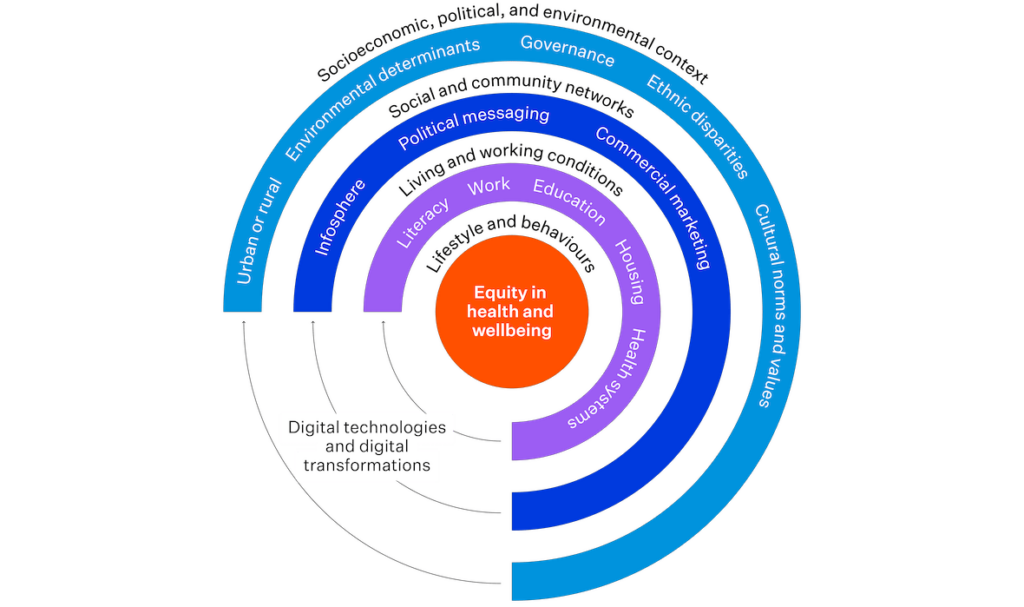Imagine a future where disease doesn’t creep up unnoticed but is detected at the earliest possible moment — or even before symptoms arise. This vision is rapidly becoming a reality, thanks to the convergence of digital health technologies and a deeper understanding of the social, environmental, and biological determinants of health.
How digital health is shifting the healthcare paradigm
Today’s healthcare system is moving from treatment to prevention. Digital health interventions—such as mobile apps, wearable devices, clinical decision-support systems, and telehealth platforms—are already delivering significant improvements in primary care outcomes.
These technologies enable earlier detection of disease risk factors and offer continuous health monitoring. As a result, patients and healthcare providers can act proactively rather than reactively, transforming the way we manage health and wellness.

Source: Taylor & Francis Online
The power of data: early detection at scale
One striking example of the future in action is the Our Future Health programme, a large-scale initiative aiming to collect genetic, biological, and lifestyle data from millions of participants.
By integrating this diverse data, researchers can identify the earliest biomarkers of disease, enabling interventions well before a full-blown diagnosis. This personalised approach has the potential to revolutionise preventive medicine and population health management.
Digital health for health equity
Digital tools make early disease prediction possible and offer a path to greater health equity.
The Lancet Commission on Governing Health Futures 2030 highlights how, when governed ethically, digital health transformations can democratise access to healthcare and reduce disparities. However, care must be taken to address the “digital determinants of health,” such as internet access and digital literacy, ensuring no one is left behind.

Source: The Lancet
Lessons from wearable technology studies
The Apple Heart Study provides another glimpse into what’s possible. Using wearable devices, researchers detected arrhythmias like atrial fibrillation at scale, often before they led to serious complications such as strokes.
Yet, the study also underscored the importance of robust data management and active participant engagement. Without these, the full potential of digital health trials cannot be realised.
The path forward: embracing P4 healthcare
Looking ahead, the fusion of genomics, artificial intelligence, and digital health monitoring will be central to a future of predictive, preventive, personalised, and participatory (P4) healthcare.
Success will depend on three key pillars:
- Trust: Building systems that protect patient data and privacy.
- Accessibility: Ensuring digital health solutions reach diverse populations.
- Engagement: Empowering individuals to actively participate in their health journey.
If we can uncover the early patterns of disease, healthcare interventions will not only be faster but also smarter, more targeted, and far more effective.

Sources: European Commission, Federal Office of Public Health Switzerland, Our Future Health UK, Ministry of Health Singapore and Framingham Heart Study.
Transforming health with digital tools
Digital health solutions, combined with a strong commitment to addressing the full ecosystem of health determinants, offer our best opportunity to shift from reactive care to proactive health management.
The future of healthcare is not just about treating diseases — it’s about preventing them altogether.
References
Willis, Van C., Kelly Jean Thomas Craig, Yalda Jabbarpour, Elisabeth L. Scheufele, Yull E. Arriaga, Monica Ajinkya, Kyu B. Rhee, and Andrew Bazemore. “Digital Health Interventions to Enhance Prevention in Primary Care: Scoping Review.” JMIR Medical Informatics 10, no. 1 (2022): e33518. https://doi.org/10.2196/33518.
2. Our Future Health. Our Future Health Protocol Version 5.8. December 20, 2024.
3. Kickbusch, Ilona, Dario Piselli, Anurag Agrawal, Ran Balicer, Olivia Banner, Michael Adelhardt, et al. “The Lancet and Financial Times Commission on Governing Health Futures 2030: Growing Up in a Digital World.” The Lancet 398, no. 10312 (November 6, 2021): 1727–1776. https://doi.org/10.1016/S0140-6736(21)01824-9.
4. Turakhia, Mintu P., Manisha Desai, Haley Hedlin, Amol Rajmane, Nisha Talati, Todd Ferris, et al. “Rationale and Design of a Large-Scale, App-Based Study to Identify Cardiac Arrhythmias Using a Smartwatch: The Apple Heart Study.” American Heart Journal 207 (2019): 66–75. https://doi.org/10.1016/j.ahj.2018.09.002.
5. Garcia, Ariadna, Vidhya Balasubramanian, Justin Lee, Rebecca Gardner, Santosh Gummidipundi, Grace Hung, et al. “Lessons Learned in the Apple Heart Study and Implications for the Data Management of Future Digital Clinical Trials.” Journal of Biopharmaceutical Statistics 32, no. 3 (2022): 496–510. https://doi.org/10.1080/10543406.2022.2080698.
6. De la Torre, Katherine, Sukhong Min, Hyobin Lee, and Daehee Kang. “The Application of Preventive Medicine in the Future Digital Health Era.” Journal of Medical Internet Research 27 (2025): e59165. https://doi.org/10.2196/59165.




